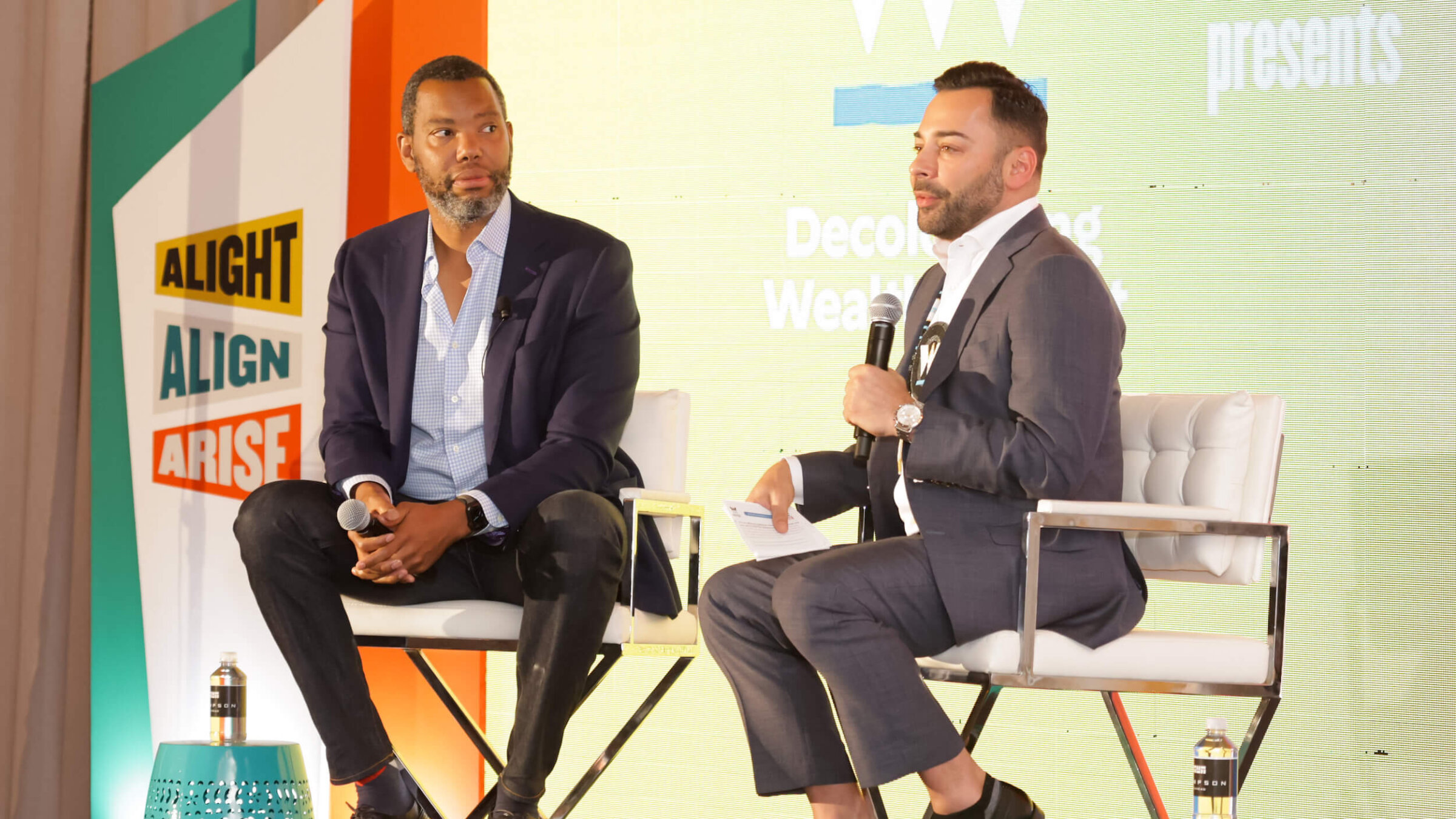After all that controversy, here’s why Ta-Nehisi Coates (probably) didn’t change any minds on Israel-Palestine
Coates’ trademark approach to journalism met a subject it couldn’t make sense of

Ta-Nehisi Coates (left) and Edgar Villanueva (right), founder of the Decolonizing Wealth Project, speaking in June, 2023. Photo by Carol Lee Rose/Getty Images for Decolonizing Wealth Project
Ta-Nehisi Coates’ latest book, The Message, seems to have left half the world outraged — and the other half elated. In both cases, it’s because of what he has to say about Israel and Palestine.
That’s fair: This topic takes up more than half of the book. The first two chapters, which describe Coates’ journeys to Senegal and South Carolina, include an examination of Coates’ cultural ancestry and his current personal experiences. But he comes to Israel and Palestine as a complete outsider, making the earlier chapters look like warmups to reach his bigger point.
That point is Coates’ advocacy for what might be called morality journalism — at least as much it’s an obvious message about the immorality of Israel’s treatment of Palestinians.
When he immerses himself in the region, Coates laments that even journalists he admires convey that “comprehension of ‘conflict’ was a matter of knowledge, not morality.” Toward the end of his Israel-Palestine journey (and the book), he concludes that “It’s not that the facts of the stories are so wrong” but rather “the elevation of factual complexity over self-evident morality.”
What does his morality-driven approach look like? In part, it looks like a keen observer’s firsthand chronicle and travel diary as Coates takes a tour through Palestinian experiences of occupation and discrimination in places like Ramallah, Lydd, Jerusalem, Hebron and Haifa. He sees movement restrictions; the architecture of segregated infrastructure in the West Bank; the segregation, even, of water sources.
He experiences the Israeli side too, visiting Yad Vashem, which his detractors tend to downplay. But most of his conversations are with other critics of occupation: activists from Breaking the Silence, former Israeli soldiers who devote themselves to exposing the practices of occupation — my own friends and colleagues — and the rightly-revered Haaretz journalist Amira Hass.
But his descriptions of “walking the land,” as he calls on young writers to do, seem secondary to his thoughts and inner experience. The heart of his examination of Israel and Palestine is his own intensifying emotional state, as he stretches to find words to transmit his horror to the audience. The situation is beyond Jim Crow, beyond apartheid. His message about the rank immorality of occupation is clear — and one that I personally share.
But this can lead to impressionistic observations, rather than firm or clarifying political analysis. Coates calls Jerusalem divided. Traditional supporters of the two-state solution wish it was so — but Jerusalem is politically united. Specific neighborhoods are ethno-nationally divided, to be sure, but it’s precisely the population crossover that makes it hard for Jerusalem to ever be truly divided. He refers to Palestinians as “enslaved,” a word that prioritizes emotional charge over descriptive precision.
Readers looking for a full political or historical analysis will therefore need more and different kinds of work. Reflexive criticism of Coates for parachuting in misses the point of what he’s trying to do. And while it was naïve to think that he could leave out both Oct. 7 and the war in Gaza war without creating a gaping hole for readers today, it doesn’t make either Coates or the book antisemitic.
But there is a more serious weakness to Coates’ “morality journalism”: the categorical dismissal of complexity, which other critics have called out as well. “I would sooner hear a defense of cannibalism than I would hear any brief for what I saw with my own eyes,” Coates writes.
Really? Would he say this if he was covering the Holodomor, the mass slaughter of four million Ukrainians by starvation in the 1930s, during which cannibalism has been documented? Obviously, this is not a comparison or a justification of Israel’s actions; it is a challenge to that idea that some things do not have another side, when I suspect most things do.
But ignoring complexity is self-defeating for his own purpose too, because complexity is an essential tool of the occupation itself. The best example is the impenetrable bureaucracy that is a backbone of Israel’s power over Palestinians, as the Hebrew University sociologist Yael Berda demonstrates in her extensive work on colonial bureaucracy. Understanding the complexity of occupation mechanisms used to confuse and control Palestinians is critical to exposing, not just exonerating, the oppressor.
And most urgently, without seeing the “other” side, how can one understand the very mindset of one of the parties that needs to change, that of Israelis?
The answer is that Coates clearly isn’t writing to change the minds of those who hold the power, but to haunt those already inclined to oppose it. He’ll probably succeed. Whether more outrage about what is already the world’s most controversial topic will change anything for its victims is far less certain.
A message from our CEO & publisher Rachel Fishman Feddersen
I hope you appreciated this article. Before you go, I’d like to ask you to please support the Forward’s award-winning, nonprofit journalism during this critical time.
We’ve set a goal to raise $260,000 by December 31. That’s an ambitious goal, but one that will give us the resources we need to invest in the high quality news, opinion, analysis and cultural coverage that isn’t available anywhere else.
If you feel inspired to make an impact, now is the time to give something back. Join us as a member at your most generous level.
— Rachel Fishman Feddersen, Publisher and CEO